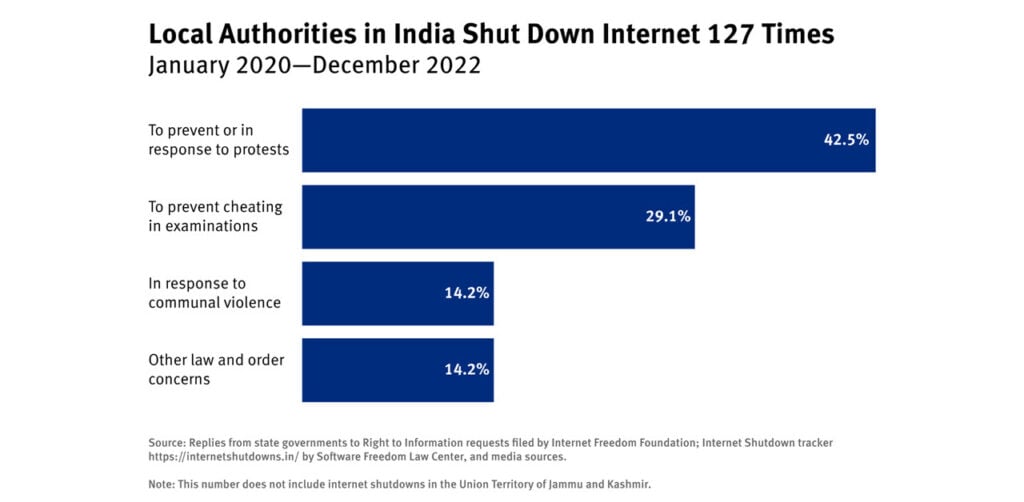India’s internet shutdowns disproportionately impact impoverished communities that rely on the government’s social protection programs for their livelihoods and basic needs.
A report titled “No Internet means no work, no pay, no food: Internet shutdowns deny access to basic rights in Digital India” highlights how India has surpassed all other countries in internet shutdowns since 2018, undermining the government’s Digital India initiative that promotes internet access for public services.
The 82-page report reveals that internet shutdowns violate economic, social, and cultural rights under Indian and international human rights laws. Indian authorities have frequently disregarded Supreme Court’s orders that mandate procedural safeguards to ensure shutdowns are lawful, necessary, proportionate, and limited in scope. Shutdown decisions by central and state governments often lack legality, display erratic behaviour and unlawfully restrict protests, and curb exam cheating.

As a means of collective punishment, state governments in India have resorted to internet shutdowns. In March 2023, Punjab experienced a three-day mobile internet blackout imposed to locate a separatist leader. Similarly, in response to ethnic violence, the state government of Manipur implemented a complete month-long internet blockage on mobile and fixed-line services in May.
The report features interviews with over 70 individuals affected by internet shutdowns across multiple regions, including Jammu and Kashmir, Rajasthan, Haryana, Jharkhand, Assam, Manipur, and Meghalaya. The absence of official shutdown data hampers efforts to hold the government accountable.
The longest internet shutdown in India occurred in Jammu and Kashmir, lasting 550 days from August 2019 to February 2021. In response, the Supreme Court emphasized that suspending internet services should only be considered as a last resort after exploring less intrusive alternatives.
The report highlights India’s broad and inadequately safeguarded laws governing internet shutdowns. Between the Supreme Court’s decision and December 2022, 127 shutdowns were identified across 18 states, excluding Jammu and Kashmir. State governments used these shutdowns to prevent or respond to protests, curb exam cheating, address communal violence, and maintain law and order.

Most shutdowns primarily targeted mobile internet access, resulting in near-total internet blackouts in affected regions due to the heavy reliance on mobile devices. Rural areas, in particular, are heavily impacted as mobile connectivity is vital, with only 4% of the population having access to fixed-line internet.
Human rights experts have consistently criticized blanket internet shutdowns, emphasizing that such measures are not justifiable under international human rights law. Despite claims by Indian authorities that shutdowns are necessary for maintaining public order, there is no evidence to support their effectiveness.
Access to the internet is recognized as a fundamental enabler of various human rights, and internet shutdowns contradict India’s commitment to digital freedom. The report calls on the Indian government to cease this abusive practice, as it carries severe costs for the country’s reputation and its people.
In the News: Google files lawsuit against scammer for fake reviews






